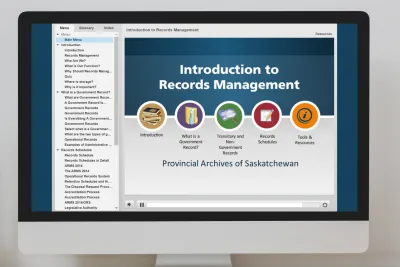Records Management Training
Online Training
The following Records and Information Management (RIM) training courses have been created by the Provincial Archives of Saskatchewan and are available to executive government employees and the public.
Executive Government employees should access the courses through PSC Client. The courses can be found in PSC Client by searching under My Learning for “records.”
Non-executive government employees and the public can access the courses by following the links for each course below.

Image of the Introduction to Records Management training module.
-
Introduction to Records Management (basic overview)
-
Introduction to RIM For Executives
-
Records and Information Management (in-depth)
-
Part 1: Records Management Programs
-
Part 2: Records and Record Types
-
Part 3: Schedules and Disposals
-
Part 4: File Management
-
Records Schedule Development Training
-
Resource
Introduction to Records Management (basic overview)
This course provides a basic overview of records management as it applies in Saskatchewan government. The session takes approximately 30 minutes and can be stopped and restarted at any time, if required.
Introduction to Records and Information Management For Executives
A brief introduction to Records and Information Management (RIM) tailored to executives, that explains RIM concepts and the importance of an effective RIM program. The session takes approximately 30 minutes and can be stopped and started at any time, if required.
Records and Information Management (in-depth)
This RIM training includes information about RIM programs, legal requirements for records management, records schedules including ARMS2014 and their use, records retention periods, file storage, naming conventions, electronic records management, etc.
Training consists of 4 parts, each of which contains 3 or 4 modules. Sessions can be stopped and restarted at any time, if required.
Part 1: Records Management Programs
Part 1 provides an introduction to RIM programs: what they are, why they are required, and the framework for developing and maintaining a successful program.
Module 1: What is Records Management? (3 minutes)
Module 2: Records Management Programs (5-10 minutes)
Module 3: Legislation Governing Records Management (4-5 minutes)
Part 2: Records and Record Types
Part 2 defines what a record is in the context of the Saskatchewan Government. It identifies the different types of records and explains the responsibilities and requirements for dealing with each.
Module 4: What is a Record? (4 minutes)
Module 5: Government, Transitory, and Non-Government Records (5-10 minutes)
Module 6: Administrative and Operational Records (6-8 minutes)
Part 3: Schedules and Disposals
Part 3 focuses on records schedules along with the retention and disposal of records. It details the different types of records schedules and how to use them properly. It also explains how retention periods are calculated and the disposal request process.
Module 7: What is a Records Schedule? (4-6 minutes)
Module 8: Types of Records Schedules (10-15 minutes)
Module 9: Retention and Disposal (8-13 minutes)
Part 4: File Management
Part 4 focuses on the logistics of records management with special considerations for electronic records. It details file storage, both physical and electronic, and the tracking, inventorying, and maintenance of records throughout their lifecycle. The last module describes the responsibilities associated with managing email records along with options and best practices for doing so.
Module 10A: Filing Systems and Naming Conventions (8 minutes)
Module 10B: File Storage and Tracking (5 minutes)
Module 11: Electronic Records Management (10 minutes)
Module 12: Email Management (6 minutes)
Records Schedule Development Training
The following interactive course provides an overview of the schedule development process in the Saskatchewan government. While this training focuses on an operational records system for a fictitious ministry, it applies to other types of schedules used in Saskatchewan government. The session should take approximately 45 minutes and can be stopped and started at any time, if required.